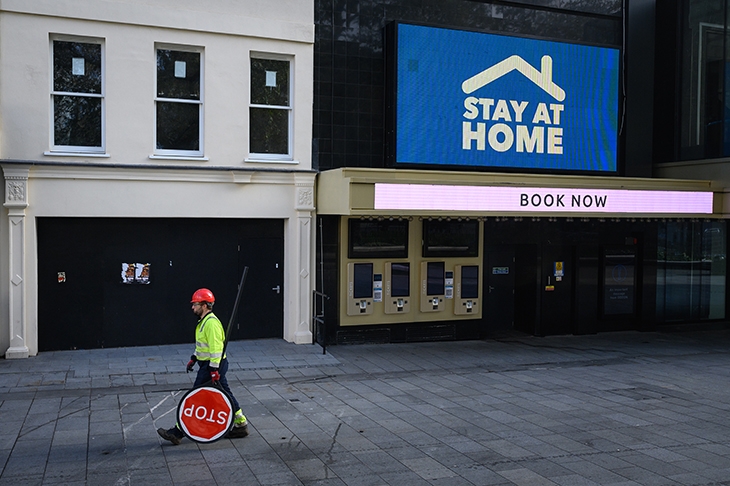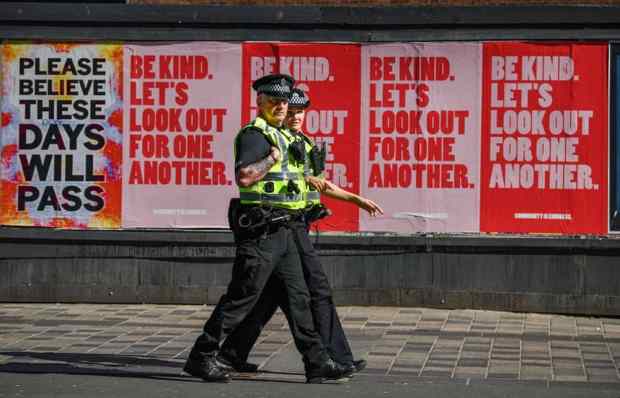Cancelled procedures
Sir: Your leader (‘A lockdown too far’, 7 November) suggests that the Prime Minister should have shown ‘leadership’ and ignored Sage’s call for a second national lockdown. Sam Carlisle (‘No respite’, 7 November) illustrates why this would have been a mistake. Sam reminds us that ‘half of community paediatricians were deployed to acute services’ during the pandemic’s first wave. Many other specialists were similarly redeployed. That the NHS was not overwhelmed in the first wave was precisely because most routine work stopped and staff were redeployed en masse to treat Covid-19 patients. Leaving projections aside, there were in fact 13,000 Covid-19 patients in hospital on Sunday 8 November. This is only 7,000 fewer than at the peak. Hospitals in Birmingham, Manchester, Edinburgh and Nottingham have already been forced to cancel non-urgent work to ensure that Covid-19 wards and ICUs are adequately staffed. If people believe such cancellations — and the harm they cause to people with conditions other than Covid-19 — are a price worth paying to avoid a severe national lockdown, they should have the courage to acknowledge this trade-off explicitly.
James Wilkinson
Stratford-upon-Avon, Warwickshire
We need an inquiry
Sir: Rod Liddle highlights the cruelty of transferring elderly patients from hospital into care homes (‘There is no Santa Claus, Sir Patrick’, 7 November), but the real scandal is the lack of NHS beds which made this necessary. We have fewer hospital beds than almost any other European country — Germany, for example, has five times the number per head of population, which explains why its death toll is a quarter of ours. What is more, the reduction of our bed capacity has been an active policy, enthusiastically pursued over the past 30 years despite repeated warnings that it could lead to disaster. Liddle is quite right: when all this is over we need an inquiry into how we arrived at this point, and, more importantly, to take steps to ensure that we are never in this position again.
Dr Chris Nancollas
Yorkley, Glos
Who should isolate?
Sir: Alberto Giubilini suggests that incentivising those vulnerable to Covid-19 to self-isolate might be an alternative to lockdowns (‘The ethics of lockdown’, 7 November). I am puzzled as to what form this ‘incentive’ might take. Can there be any incentive greater than the desire to avoid becoming dangerously ill? It is hard to see what Giubilini could have in mind other than financial compensation — and it is equally hard to see how that would relieve the distress of isolation, especially from loved ones. Nor would it solve the problem faced by multigenerational households, with their younger working members placed at far greater risk of bringing the virus home to the elderly. Perhaps it is they who need to be incentivised to stay at home, with the state picking up the tab, and with a statutory guarantee against career damage.
Maybe the answer is for the state to throw resources not at instant tests for all, but at instant tests for all those wanting to visit their isolated loved ones so they can do so without fear of infecting them.
David Cockerham
Bearsted, Kent
How to buy a car
Sir: I agree with Lynn Barber that what should be the straightforward process of buying a car is unnecessarily complex (‘Driven mad’, 7 November). My late father wisely informed me in around 1980 that there was no such thing as a bad car: they all worked. This is even more true today, and unless one is a fully paid-up petrolhead, there is no point whatsoever in looking beyond the interior decor and making sure you fit into the driver’s seat. Possibly the sound system is worth a quick once-over — but even the exterior colour is not your problem, as you will be on the inside. The only other factor to consider is speed of delivery, so buy one already in the showroom. No need to drive it round the block beforehand. It will work.
Tim Rice
Hambleden, Henley-on-Thames
Beginnings of brotherhood
Sir: Michael Nazir-Ali is not correct to claim that freedom, liberty and the brotherhood of all men flow from Christianity — as if such values did not exist in the ancient world, east and west (‘Christianity is our best defence’, 7 November). The Greeks had democracy 500 years before Christ, and, tellingly, enemies were sometimes more sympathetically treated than today. My favourite example is how Athens dealt with the defeated rebels of Potidaea. The population was sent into exile with just the clothes they stood up in, but the women were permitted an extra dress. There’s brother-and-sisterhood for you.
Michael McManus
Leeds
Ducking and diving
Sir: Roger Alton’s attack on those who ‘cheat’ by diving is timely (Sport, 7 November). Things are not helped by the fact that commentators and journalists insist on talking about ‘winning’ penalties: one newspaper even gave us a list of players who had ‘won the most penalties’ this season, thus making it seem like something one should aim for. It is surely defenders who give away penalties, rather than forwards who win them.
Ian Baird
Framlingham, Suffolk
Orange crush
Sir: If Kevin Pakenham had been called upon by Charles Moore to defend his choice of the word ‘marmalade’ as a descriptor of female charm (Notes, 7 November), he would have been able to pray in aid James Hogg’s ‘My Love She’s but a Lassie Yet’: ‘But O her artless smile’s mair sweet/ Than hinny or than marmalete…’.
Charles Phipps
Lechlade, Gloucestershire
Got something to add? Join the discussion and comment below.
Get 10 issues for just $10
Subscribe to The Spectator Australia today for the next 10 magazine issues, plus full online access, for just $10.
You might disagree with half of it, but you’ll enjoy reading all of it. Try your first month for free, then just $2 a week for the remainder of your first year.














Comments
Don't miss out
Join the conversation with other Spectator Australia readers. Subscribe to leave a comment.
SUBSCRIBEAlready a subscriber? Log in